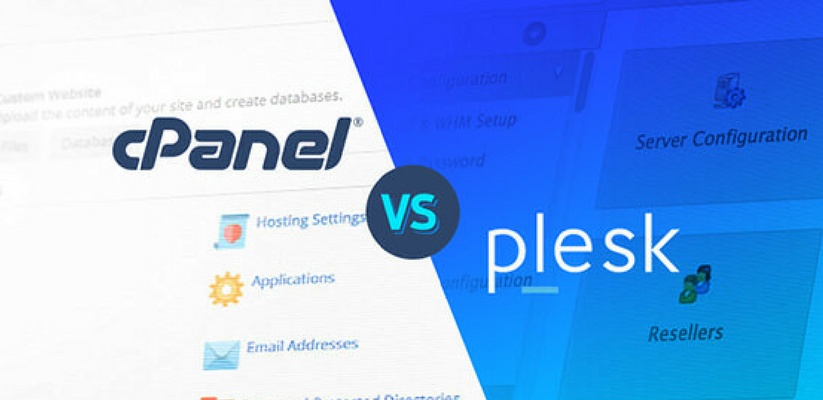
Which Hosting Control Panel Is Best for You: cPanel or Plesk
Which Hosting Control Panel Is Best for You: cPanel or Plesk
Whether you are a startup company or a big organization leasing out dedicated servers, your web server’s control panel is the prime gateway to your online business. And with multiple options in control panel before you, considering the strengths and weaknesses of all the panels is vital to take informed decisions and enjoy better performance in the long run. Though at times it gets tough to decide which web hosting control panel you should opt for, but things can become easy if you are aware of the pros and cons in order to serve your customers in a better manner.
Since from web analytics to spam filtering, a website uses varied hosting features in the day to day operations, all the leading control panels deliver most of the features that can meet the requirements, but each differs in maintainability, usability, security and many more. A server control panel is an interface that enables the customers to manage their hosted services from a single place. Such control panels are available for the servers with Linux and Windows OS. The two most popular web panels in the market today are cPanel and Plesk. Though both achieve the same goals of managing the website and other hosting functions, there are some unique differences which I will discuss today with you.
cPanel and Plesk: An overview:
cPanel is a Linux based control panel offering automation tools and GUI that helps to simplify the web hosting process. It is popular and is used by big as well as small hosting solutions. Since its inception, cpanel has evolved a lot. Earlier it used to have variants for FreeBSD and Windows platforms, but today the focus rests on Linux servers.
Plesk is another most popular web hosting control panel that offers a role based access to the users. It allows them to set design cloud based applications, websites, manage database, reseller accounts, mails and other valuable services for Windows as well as Linux servers. Most of its frontend is coded in PHP. Its support for the Windows hosting servers has given it a reason to be profitable.
A comparison between cPanel and Plesk:
User interface:
The UI might not seem to be very important initially, but it is usually the first difference that people notice between the two control panels. This is considered to be the biggest hurdle when moving between the two. Plesk is considered to have a cleaner and attractive interface and I too personally agree with it. But on the other hand cPanel is more popular and since many users are comfortable with it, they might consider its interface to be friendlier.
Operating system support:
Though both the control panels provide a great GUI, it still helps a lot to be comfortable with the OS that the server runs on. cPanel runs exclusively on the Linux systems and it supports three versions like the CentOS, RedHat and the CloudLinux. Beside any limitations, it is popular in the market because of the prevalence of Linux in the server marketplace.
On the other hand, Plesk offers support for a wider variety of OS that includes variations within the Linux itself. Besides the three Linux OSs that are supported by cPanel, Plesk can also be run on Debian openSUSE and Ubantu.
Admin Panels:
cPanel comes with WHM, Web Host Manager as a standard, but shared hosting users will not be able to see WHM until they upgrade to VPS or reseller hosting. The WHM is for the server administrator and the cPanel side is for the website owner. The two systems have separate logins and interfaces, although they are linked.
Plesk has a single login for the users and the administrators and both look similar, though the options are quite different.
Functionality:
If you consider only the basics, a control panel is expected to deliver 4 services that include the DNS, Mail, Database and the Web. But business organizations also need SSL management, reseller support, backups, spam filtering and etc. Both Plesk and cPanel offer these popular features, but the key difference is that these panels also offer additional features offered by 3rd party application providers. cPanel offers API based access that allows external providers to build add-ons. There are also few under the Plesk Extensions directory that can easily be enabled with some server administration.
Security:
Another most important thing is the security of accounts and the servers. Both the panels have segregated account access mechanism of the server itself and both of them offers extensions to install firewalls, anti-spam filters, multi factor authentication and etc. Plesk is said to react to vulnerabilities faster and acknowledges an issue within 1 day and releases a fix on an average of 9 days. While on the other hand cPanel acknowledges vulnerabilities at an average of 9 days and releases a fix on an average of 28 days.
Costing:
The cost of cPanel varies based on whether you install it on a VPS or a dedicated server or not. For the VPS, a yearly license may cost $200 as opposed to $425 for the dedicated servers, which breaks to $35 per month for unlimited use. For a similar plan Plesk costs $40 per month.

Thanks for sharing such informative blog. This blog was helpful & informative.
Great post regarding control panel.
Clear explanation about each and every point.
This article is really will help the users whose are looking for solutions.
Good job.